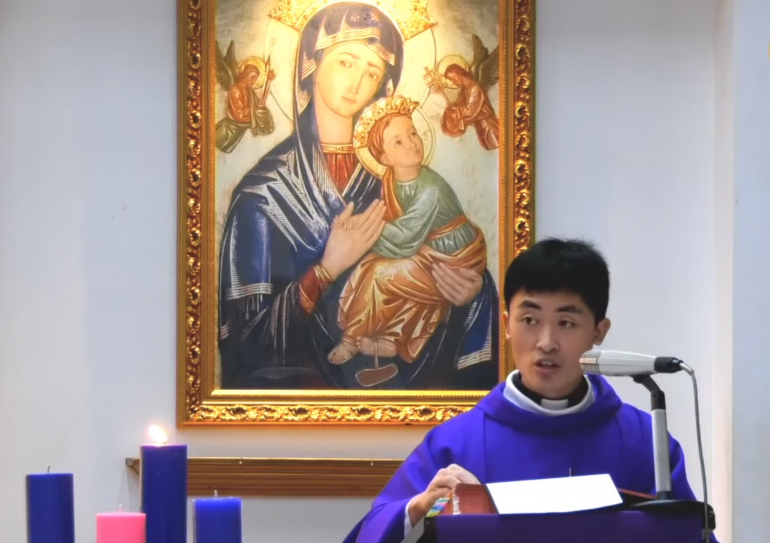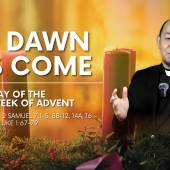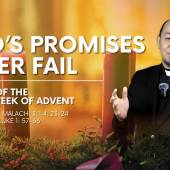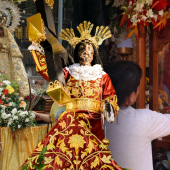ADVENT: Be sensitive to the voice of God, to the signs of His presence

Today is the first Sunday in Advent, a new beginning of liturgical year. The season of Advent proceeds the season of Christmas which is the coming of Jesus. Thus the spirit of Advent is about preparation, hope and penance. But the basic element for Advent is joy.
Today, as you enter the chapel, you may notice some changes. First of all, the color of the altar cloth and the stoles wore by priests has changed. It is purple or violet, symbolizes penance. When we think about “Penance”, easily we connect it with fasting, abstinence, prayer and mortification. These lead us to the second change.
For Sunday Masses during Advent, we don’t sing “Gloria”. Because “Gloria” is a song of joy and happiness. We won’t sing Gloria until December 24, Christmas Eve.
Thirdly, you may notice that in front of the altar there is “advent wreath” with four candles on it. The wreath is green, because green is the color of life, everlasting life. These four candles represent the themes of four Sundays in Advent, namely, Hope, Peace, Joy and Emmanuel, God is with us. Before the start of this celebration of Eucharist, we lighted the first candle, the candle of Hope, because Jesus is coming. He would bring us the hope of obtaining salvation.
Every year we celebrate Advent before Christmas, but how does it affect our real life?
We might have the thought that every year Advent and Christmas are the same. It is like that we are in a circle, turning around and getting bored and lost eventually. But let us be reminded once more that Advent is not only a preparation for the coming of Christmas which we celebrate every year, but also a preparation for the second coming of Jesus.
In the second letter of Peter in the Bible, it says that “in the last days scoffers will come to scoff, living according to their own desires and saying, ‘Where is the promise of his coming? From the time when our ancestors fell asleep, everything has remained as it was from the beginning of creation’”(2 Peter 3:4. The Lord does not delay his promise, but He is patient with us, not wishing that any should perish but that all should come to repentance.
In a family context, if we see our son or daughter commits a certain fault, let’s say “not showing respect to their grandparents”, we will not beat him or her immediately. Instead, gently we will try all means, with words and with examples, to teach him or her how to behave. Furthermore, we will remind him or her for several times. Eventually if he or she does not listen to our correction, then it is the time that we might lose patience to discipline them in order to correct their faults for their own good.
Like a father to his children, our Lord is much patient with each one of us, His beloved child. Let us not take this as a chance of abusing His patience, but as an opportunity to become holier day by day.
In today’s Gospel (Matthew 24:37-44), Jesus says “stay awake! For you do not know on which day your Lord will come.” During the first eight days of November, I went to visit the cemetery at the back part of the Good Shepherd Cathedral. It was surprising for me to see that many of them died at very young age. Some of them were born in the same year as me. Truly we don’t know when our time would come. Jesus gave us the solution: “stay awake!”
In the second reading for today, from Romans 13:11-14, we hear, “it is the hour now for you to awake from sleep.” Because our salvation is nearer now than when we first believed. When salvation comes, only those who are prepared will be able to grasp it.
St. Paul gave us an invitation: “Let us then throw off the works of darkness.” What are the works of darkness? As mentioned in the letter, they are orgies and drunkenness, promiscuity and licentiousness, rivalry and jealousy. St. Paul asked us not “walking away from these, but throwing them off.”
Let us imagine the act of throwing rubbish or garbage. Usually we carry a bag of garbage with our hands, even only with fingers. Because these garbage are dirty, we want to get rid of it as soon as possible. After throwing it into garbage can, what would you do? If you don’t do it, your family members would remind you. It is to wash our hands. Exactly. We want to be totally separated from things dirty, filthy, and unclean.
St. Paul is advising us to be totally free from the works of darkness, not even having a sense of missing these stuffs. “let us conduct ourselves properly as in the day, … put on the Lord Jesus Christ.” Jesus is not a garment which we can wear. How can we put on Jesus?
The first reading from the book of the Prophet Isaiah (Isaiah 2:1-5), says “The Mountain of the Lord’s house shall be established as the highest mountain and raised above the hills. All nations shall stream toward it; many peoples shall come and say: ‘come, let us climb the Lord’s mountain, to the house of the God of Jacob, that he may instruct us in his ways, and we may walk in his paths. For, from Zion shall go forth instruction, and the word of the Lord from Jerusalem.’”
All nations would stream toward the mountain of the Lord. They did not go for wealth or power or pleasure, but for instructions from the Lord. Thus “To put on Jesus” means “to listen to the instructions of the Lord”, “to hear the word of the Lord” and “to walk in the righteous paths.”
In order to hear truly the instruction of the Lord, we need to have an ear of sensitivity, and ear of being alert.
I remember a certain experience. Several years back, together with my friends, we visited a university. Upon entering the ground floor of a building, we saw the corridor was full of students from different colleges. As we were passing through the crowd, one friend told me: “there is someone playing the piano in this floor somewhere.” “Are you sure? But I could hear nothing.” I said in reply. “Yes, I am sure.” He said once more.
By the way, this friend of mine is a musician, a pianist. Then he started to find where that sound of piano came from. Several seconds later, he pointed me a certain room. I went to take a look, through the glass on the door, I saw a group of students having song practice. They had several musical instruments accompany their singing and one of those was a piano. I was amazed how sensitive was my friend’s ears to music. Maybe this we can call “Professional”.
The ears of a musician is sensitive to music. And we, Christians, our ears should be sensitive to the words and voices of Christ.
In this season of Advent, let us train ourselves to develop the habit of being sensitive to the voice of God, to the signs of His presence.
- Father Francis Han, RVA Mandarin Service
Year A - 1st Sunday of Advent:
Isaiah 2:1-5 - Zion, the Messianic Capital; Romans 13:11-14 - Awareness of the End of Time; Matthew 24:37-44 - the Unknown Day and Hour.
Radio Veritas Asia (RVA), a media platform of the Catholic Church, aims to share Christ. RVA started in 1969 as a continental Catholic radio station to serve Asian countries in their respective local language, thus earning the tag “the Voice of Asian Christianity.” Responding to the emerging context, RVA embraced media platforms to connect with the global Asian audience via its 21 language websites and various social media platforms.














